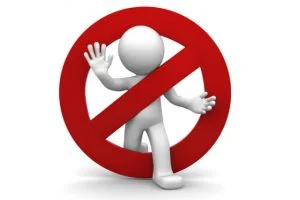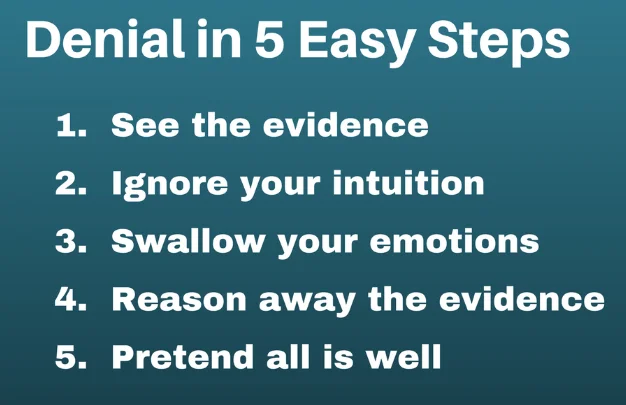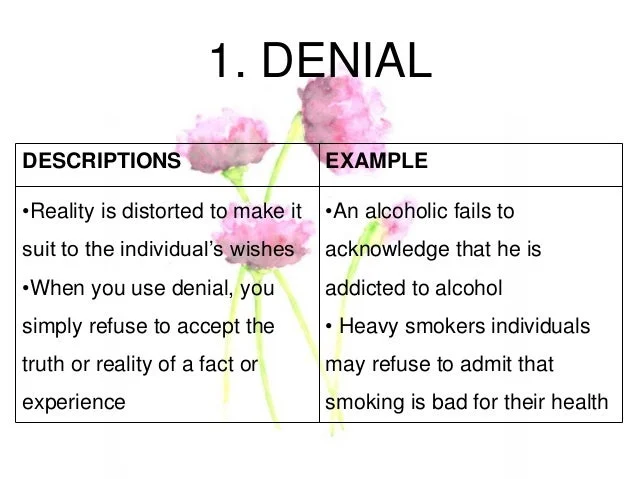It’s human nature to avoid difficult truths and unpleasant realities. We often do this by denying that something is happening, even when the evidence is staring us in the face. This can be a very dangerous tendency, especially when it comes to our personal lives or the life of our country. In this blog post, we will explore 11 examples of denial and how it can lead to disaster.
Contents
What Is Denial?
 Denial is a coping mechanism that people use to avoid the pain of reality. It is a defense mechanism that allows people to protect themselves from difficult truths and feelings. People often deny unpleasant facts because they are too painful or frightening to face.
Denial is a coping mechanism that people use to avoid the pain of reality. It is a defense mechanism that allows people to protect themselves from difficult truths and feelings. People often deny unpleasant facts because they are too painful or frightening to face.
Denial can take many different forms, including:
• refusing to believe that a problem exists
• denying that you are responsible for your actions or behavior
• pretending that something is not happening
• saying that things are not as bad as they seem
Signs of Denial
The signs of denial can vary depending on the person and the situation. However, some common signs of denial include:
• refusing to face facts or reality
• making excuses for bad behavior or mistakes
• downplaying the seriousness of a problem
• pretending that everything is okay
• feeling overwhelmed or confused by events happening around you
Causes of Denial
There are many different causes of denial. Some of the most common causes include:
• fear of pain or loss
• feeling overwhelmed or helpless
• guilt, shame, or self-blame
• disbelief in the reality of a situation
• lack of information or knowledge about a problem
How Does Denial Affect You?

Denial can have a significant impact on your life, both mentally and physically. It can prevent you from seeking help for problems that need attention, from dealing with difficult emotions, and from making positive changes in your life.
If you are in denial about something, it is likely to cause you stress and anxiety. You may also find it difficult to concentrate or make decisions. Additionally, denial can lead to problems in your relationships and can even be harmful to your health.
Examples of Denial

There are many different examples of denial, but some of the most common include:
Denial of Reality
The first example is a denial of reality. This type of denial occurs when people refuse to accept that something is happening or is true. For example, a person might deny the existence of a problem in their relationship or deny that they are sick.
Denial of Responsibility
The second example is a denial of responsibility. This type of denial happens when people take no ownership of their own actions or behavior. For example, a person who cheats on their partner may claim that it is not their fault because they were drunk at the time or that their partner was never good to them anyway.
Denial of Emotion
The third example is a denial of emotion. This type of denial occurs when people do not allow themselves to feel certain emotions. For example, a person might deny their anger or sadness and instead feel numb. This can lead to problems in their personal life and relationships.
Denial of Facts
The fourth example is a denial of facts. This type of denial occurs when people refuse to accept certain information or facts because they are too painful or frightening. For example, a person might deny that their loved one has died or that they are struggling with a mental illness. It can be very harmful to deny the facts in a situation.
Denial of Future
The fifth examples id a denial of the future. This type of denial occurs when people refuse to plan for the future or think about what could happen. For example, a person might refuse to save money for retirement or they may not want to think about how they will cope if their partner dies.
Denial of Death
The sixth example is a denial of death. This type of denial occurs when people avoid thinking about death and the fact that we all die someday. For example, a person might not want to talk about funeral arrangements or they might avoid visiting gravesites.
Denial Groupthink
The seventh examples is a denial groupthink .This type of denial occurs when people in a group deny information or reality because it does not fit with their view of things . For example , people in a group might deny that there is a problem with the way they are working or they might deny that their company is in trouble.
Denial of Self
The eight example if denial of self. This type of denial occurs when people do not accept who they are and instead try to be someone else. For example, a person might dress differently than they would normally dress or they might change their personality to fit in with a group.
Denial of Other People
The ninth example is denial of other people .This type of denial occurs when people do not trust or like other people. For example, a person may think that everyone is out to get them or that no one can be trusted.
Denial of Change
The tenth example is a denial of change. This type of denial occurs when people are afraid to change or they resist change. For example, a person might not want to try a new food or they might be upset about changes at work.
Denial of Life
The eleventh and final example is a denial of life. This type of denial occurs when people refuse to live their lives according to their own values and instead try to live someone else’s life. For example, a person might give up their dreams in order to please their parents or they might take a job that they hate because it is safe.
Treatment of Denial

The treatment of denial depends on the type of denial that is present. However, some common treatments include therapy, medication, and self-help groups.
Medications
Medications are one of the most common treatments for denial. There are a number of medications that can be used to treat different types of denial. Sometimes, medications are used to help people accept the facts or to help them feel their emotions.
Therapy
Therapy is another common treatment for denial. Therapy can help people understand why they are denying certain information and it can help them learn how to deal with their emotions.
Self-Help Groups
Self-help groups can also be helpful in treating denial. These groups allow people to share their experiences with others who are dealing with the same type of denial. This can be helpful in allowing people to see that they are not alone and that there are ways to cope with denial.
Conclusion
Denial is a common defense mechanism that can be very harmful to a person’s mental health. It is important to understand the different types of denial and to seek help if you are experiencing any type of denial.
There are many different types of denial, each with its own set of risks and dangers. Some common treatments for denial include therapy, medication and self-help groups. If you are experiencing any type of denial, it is important to seek help from a professional.
Denial can be a very harmful defense mechanism and it is important to understand the different types of denial. There are many different treatments for Denial including therapy, medication and self-help groups. If you or someone you know is experience any type of Denial, please seek help.
A Word From Therapy Mantra
Your mental health — your psychological, emotional, and social well-being — has an impact on every aspect of your life. Positive mental health essentially allows you to effectively deal with life’s everyday challenges.
At Mantra Care, we have a team of therapists who provide affordable online therapy to assist you with issues such as depression, anxiety, stress, relationship, OCD, LGBTQ, and PTSD. You can take our mental health test. You can also book a free therapy or download our free Android or iOS app.


